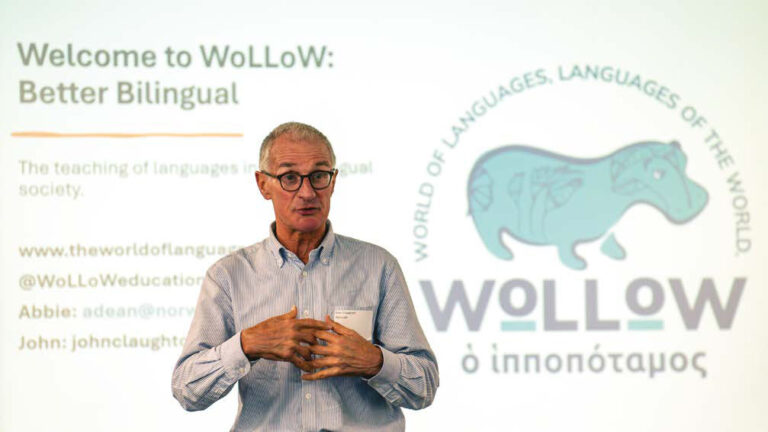The advance of the ἱπποπόταμος that is WoLLoW
‘The World of Languages and Languages of the World’ (WoLLoW) is a free languages curriculum designed to encourage curiosity, understanding and enjoyment of languages in KS2 and KS3. Launched as a result of the declining numbers of those studying languages at school and university, WoLLoW Co-founder and former Chief Master of King Edward’s School, Birmingham, John Claughton, provides an update on the initiative and how it’s not just helping language teaching but pupil understanding of the world.
Nearly three years ago – tempus fugit sicut umbra – I wrote an article for this publication – or rather the January 2022 publication – on a languages project called WoLLoW, ‘World of Languages, Languages of the World’. This project, created by some independent schoolteachers, present and, in my case, past, is designed to cut the Gordian Knot which is language teaching, particularly in junior schools. We all know that this Gordian Knot has been knotted for a long, long time and has the following strands:
- The decline in the numbers of pupils choosing to do languages, from KS3 to university, is deeply worrisome – just look at the annually gloomy Language Trends report produced by the British Council.
- The teaching of languages in junior schools, both state and independent, is variable – at best – in terms of language choice, quality, quantity and content. And, too often, it is the poor creature, overshadowed by the dual behemoths that are numeracy and literacy.
- Transition from primary school to secondary school is, in almost all cases, not transition, but oblivion: i.e. pupils almost always just start all over again and, whether that’s on the same language or a different one, it’s not ideal for generating enthusiasm amongst 11 year olds. Independent schools which have a junior and secondary section have a particular dilemma in that they do not want to give an advantage to their internal pupils over the new arrivals from elsewhere.
Since this is so, and no current interventions seem to be making much of a difference, WoLLoW is the sword of Alexander that cuts through all this. How? Well, instead of teaching a language, we teach about languages, how they work, where they come from, how they are related. Instead of teachers telling the pupils stuff – or downloading some stuff – we explore and share what the pupils themselves know. Instead of requiring the pupils to leave their own languages outside the school, we encourage them to use them, think about them, value them – and talk about them. Instead of making pupils feel that languages are secondary or useless, we show how they are at the very core of the curriculum, linking not only to English, but also to History, Geography, Science and Maths, empire and migration, indeed their own histories.
In the last three years, we have developed a complete set of resources that easily fills the Language curriculum from Year 5 to Year 9, but you don’t have to follow instructions: you can use it in any way you want and any time you want – and it’s free.
And does it work? Well, it is being used in hundreds of schools, state and independent, primary and secondary, international and special schools. And teachers seem to think so. Here is one – of many – positive responses from a teacher working in an independent junior and secondary school: “We have a wide diversity of pupils in our school, and we have a large proportion of pupils who have suppressed their culture. And now – it sounds ridiculous – but it is like a spring flower opening. They love sharing their knowledge, their cultural backgrounds. It is an absolute joy for them. I can firmly say that every single child we now teach in Year 6 is inspired. The pupils feel, for the first time ever, involved in their learning, and that is what inspires me.
And here’s another: “‘WoLLoW’ sparked their curiosity and, through recognition of heritage languages, made many feel more included and valued. Teachers love teaching it, students love studying it. And parents saw great value in ‘WoLLoW’ and they made sure they saw me to share their enthusiasm.”
And why does it matter? I’d say that it matters for two very different reasons, one narrowly linguistic, the other not. We believe that ‘WoLLoW’ is having a material impact on the attitudes of pupils – and schools – to languages, all languages and thereby, it is to be hoped, pupils might be more positive about language study in school and in the development of their own family languages. However, there is a bigger issue. On the very day I am writing this, politicians are arguing about ‘British values’, even ‘English values’, and even arguing that there is a hierarchy of cultures. It is as if everyone has to conform to some single truth. And yet, English itself is a language of migrant peoples, Angles and Vikings and Normans, and everyone must have the right to value their own cultural identity and heritage, just as we all must learn to listen and to understand the many different journeys and stories that come together in a classroom and a society. We actually believe that ‘WoLLoW’ can not only cut the Gordian Knot of language teaching but help pupils to a better understanding of the world.
WoLLoW has been created over the last seven years by John Claughton; the Head of Norwich School, Norfolk, Steffan Griffiths; languages teacher at Norwich School, Abbie Dean; and Head of MFL at Cheadle Hulme School, Cheshire, John Wilson.

